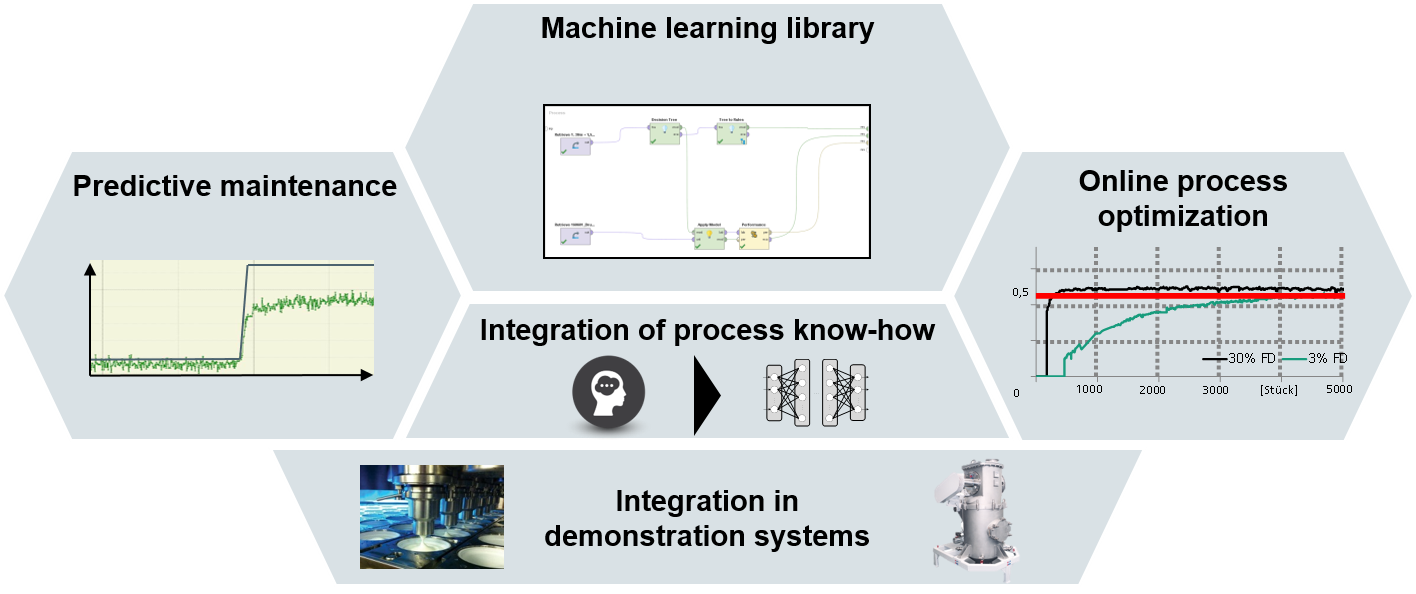Predictive maintenance and online process optimization of processing machines
Objective
The complexity of today's processing machines requires a high degree of experience knowledge of the plant operator to adjust the process parameters. Also, maintenance is carried out either preventively at defined intervals or reactively. Both are due to a lack of modeling of the machine behavior. Methods of machine learning offer the potential to model these functional relationships analytically. This has already been successfully demonstrated in numerous production engineering applications but has only been used to a limited extent for online process optimization and predictive maintenance. Furthermore, there is no approach for controlling and monitoring processing machines. Therefore, VIPER aims to develop a system for online process optimization and predictive maintenance that simultaneously monitors the condition of the machines based on the data collected by sensors on the machine and to derive actions from this data and optimize the process parameters.
Procedure
In contrast to the consumer industry, the utilization of machine learning processes in the industrial environment is not as advanced. Considering the entire cycle from the application idea to the implementation and integration is therefore helpful to develop standardized procedures and identify suitable algorithms for data pre-processing and analysis. Building on this, the transfer of Big Data into production can be accelerated.
Within the framework of the research project VIPER, the Fraunhofer IGCV dedicates itself to the outlined challenge of making machine learning processes usable in production environments together with partners from the mechanical engineering industry and software service providers. In VIPER, machine learning methods are to be used both for online process optimization and predictive maintenance to optimize ongoing operations on the one hand and predict the remaining service life of wear components on the other. The application cases are a counter jet mill and a filling plant, operated in aseptic condition.
The research project's central focus is to cover the entire process chain for the intelligent processing of machine data. This begins with the exact formulation of data analysis goals, i.e., answering what knowledge one wants to gain from data. For this purpose, it is necessary to interview experts from a company's relevant departments and record their process knowledge in a formalized way. Based on the target values recorded in this way, an overview of the required data can be created and provided with necessary context information. A standardized process value table facilitates the step to so-called Smart Data.
However, companies often neglected these often decisive preparatory steps, which is why many projects in the context of "Big Data" and "Machine Learning" are doomed to failure. At this point, the research project VIPER wants to attack and primarily provide innovative methods and concepts for a structured and targeted preparation to analyze large amounts of data.
The goal is to develop an adaptive system for online process optimization and predictive maintenance, which allows monitoring the machines' condition simultaneously and derive actions based on the data collected by sensors on the machine and carrying out process optimization. It is intended to increase machine availability, process quality, and robustness.
The system is shown in the figure, including its individual components. The system's central task is to make machine learning methods usable for the control and monitoring of machines. Therefore, an elementary part of the system provides suitable procedures in a library concerning their use for predictive maintenance and process optimization. For these two applications, supervised learning methods are applicable, which allow the structure of the training data sets to be specified by experts. This is necessary to integrate process knowledge, which is available in engineering and at the operator, into the system. Examples of this are states that are detected by condition monitoring or manipulated and target variables that are to be controlled online by process optimization. For their integration, an interface must be defined, enabling the operator to store process information and derive decisions for the design of the learning process. The blocks of predictive maintenance and online process optimization form the interface between the process library and the operator. In the modules, the learning procedures are used to generate models from data sets. Also, the model accuracy is evaluated here and made available to the operator via a visualization. The functionality of the system is demonstrated through two demonstration plants at the application partners.
